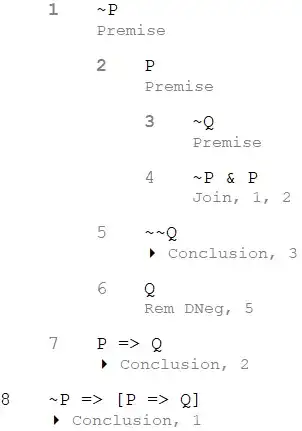From my understanding of p implies q. It means when p is true q is. For the first 2 lines of the truth table it makes sense. Now for ¬p∧q and ¬p∧¬q, why is it true? I get the idea that you haven't broken the condition, but there is still no way for me to confirm that if p then q, to confirm it I would need p to be true and check that q is in that case. For instance if I say ‘if it rains then it snows’, in the cases where it never rains, sure you can't call me a liar, but you can't say I'm telling the truth since there is no way for me to confirm it. Hence the truth of my statement should be labeled not able to be determined.
-
I don't understand the question. Yes, some propositions are vacuously true, because their premise is false. "Every integer between $1.5$ and $1.6$ is prime" is a true statement, though not a very interesting one. Is that what you are asking? – lulu Mar 12 '22 at 13:58
-
I just posted an answer here. – ryang Mar 12 '22 at 14:12
-
From something false you can derive false statements as well as true ones. If your premise is false the result can be anything. E.g. assuming $2+2=3$ and $3=4$ you get $2+2=4$ which is true even though it was derived from false assumptions. And likewise if you assume $1=2$ and $2=3$ this implies that $1=3$ which is false. That is why if the premise is false you can derive almost anything hence the truth table says "true". – Saha Mar 12 '22 at 14:24
-
When you refer to $\lnot p \land q$ and $\lnot p \land \lnot q$, note that neither of those is equivalent to $p \implies q$. Did you mean $\lnot p \lor q$? – LSpice Mar 12 '22 at 15:09
-
The formula $p\implies q$ is actually useful in only a restricted set of circumstances. If $p$ and $q$ come from physical observations at indefinitely recurring future times ("it rains" or "it snows") then indeed you can never prove $p\implies q$ as a mathematical certainty--at best you can say it has not been disproved yet. But in mathematics, we can prove that if $x$ is an integer and $x > 4$ then $x^2 > 10$ without having to observe it for every single integer one at a time. – David K Mar 12 '22 at 17:26
2 Answers
One cannot deduce falsehood from truth. You seem to agree with this part.
Now, notice that falsehood may lead to both true and false conclusions. For instance, $0 = 1 \implies 0 = 1$ but also $(\forall x | x = x^{2}) \implies 1=1^{2}.$
In conclusion, implication only tells you what happens when the predicate holds. When the predicate is false, the distinction between falsehood and truth has already been abolished within that example and thus, within that example, you may "arrive" at whatever you like. This is known as the principle of explosion.
- 1,037
Using a form of natural deduction, if you assume proposition $P$ is false (line 1 below), you can prove that $P\implies Q$ for any proposition $Q$ (line 7). Note that we would not be able to infer anything about the truth value of $Q$ here.
I make use of proof contradiction (line 5), direct proof (lines 7 and 8), and removing double negation (line 6). (Screenshot from my proof checker)
- 14,529
